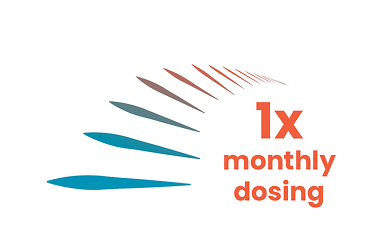IMPORTANT SAFETY INFORMATION
AVTOZMA can cause serious side effects, including:
Serious infections, which may lead to death. AVTOZMA can weaken your immune system, increasing the risk of infections or worsening existing ones. Your doctor will test for tuberculosis (TB) before starting treatment. If you have COVID-19, your doctor should monitor you for signs and symptoms of new infections during and after treatment with AVTOZMA. After starting AVTOZMA, call your doctor right away if you have any symptoms of an infection such as fever, chills, cough, or other signs of infection.
Tears (perforation) in your stomach or intestines. Some people taking AVTOZMA get tears in their stomach or intestine. This happens most often in people who also take nonsteroidal anti-inflammatory drugs (NSAIDs), corticosteroids, or methotrexate. Get medical help right away if you have stomach pain that does not go away, and a change in your bowel habits.
Liver problems. Some people have experienced serious life-threatening liver problems, which required a liver transplant or led to death. Your doctor will monitor your liver function. Call your doctor if you experience tiredness, loss of appetite, nausea, dark urine, or yellowing of the skin or eyes.
Changes in certain laboratory test results. Your doctor should do blood tests before and during treatment with AVTOZMA. Make sure you get all your follow-up blood tests done as ordered by your doctor. Your doctor may stop your AVTOZMA treatment for a period of time or change your dose of medicine if needed because of changes in these blood test results.
Cancer. AVTOZMA may increase your risk of certain cancers by changing the way your immune system works. Tell your doctor if you have ever had any type of cancer.
Do not take AVTOZMA if you are allergic to tocilizumab or any of its ingredients.
Before taking AVTOZMA, tell your doctor about all your medical conditions, including if you:
-
Have infections (with or without a fever), liver problems, or a history of stomach/intestinal
ulcers or cancer.
-
Have diabetes, HIV, or a weak immune system. People with these conditions have a higher chance for
infections.
-
Have or had hepatitis B, tuberculosis (TB), have been in close contact with someone with TB, live
or have lived or traveled to certain parts of the country (such as the Ohio and Mississippi River
valleys and the Southwest).
- Have had an allergic reaction to tocilizumab products or any of its ingredients.
- Have or had a condition that affects your nervous system, such as multiple sclerosis.
-
Have had a recent or scheduled vaccine (you should not receive live vaccines while on
AVTOZMA).
- Plan to receive surgery or a medical procedure.
-
Are pregnant, planning to become pregnant, or breastfeeding. AVTOZMA may harm your unborn baby. It
is not known if AVTOZMA passes into your breast milk.
Also, tell your doctor about all of the medicines you take, including prescription, over-the-counter
medicines, vitamins and herbal supplements.
AVTOZMA and other medicines may affect each other causing side effects. Know the medicines you take. Keep a
list of them to show to your healthcare provider and pharmacist when you get a new medicine.
The most common side effects include: upper respiratory tract infections (such as colds),
headache, high blood pressure, and injection site reactions.
These are not all the possible side effects. Call your doctor right away if you have any symptoms of an
infection or experience any side effects.
You may report side effects by calling Celltrion USA Inc. at 1-800-560-9414, FDA at 1-800-FDA-1088, or visit
www.fda.gov/medwatch.
Please see the Medication Guide and talk with your healthcare provider.

